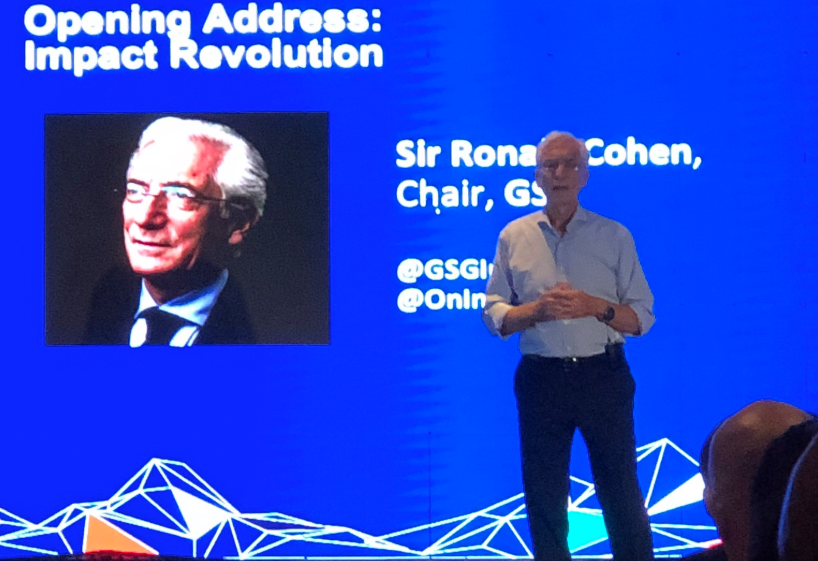ImpactAlpha, Nov. 19, 2019 –– The global gathering of impact investors that pulled out of Santiago, Chile, because of street protests and curfews regrouped in Buenos Aires to take stock of what impact investing has to offer in the face of popular uprisings around the world.
The protests added “a poignant urgency” to the first day of the annual gathering, said Sir Ronald Cohen, chair of the Global Steering Group on Impact Investing. The GSG Impact Summit gathered nearly 40 national delegations committed to building impact investing ecosystems in their countries.
“One common feature of many protests of the past year or two across the world is what is perceived to be unfair inequality,” Cohen says in an interview for ImpactAlpha’s Returns on Investment podcast. “Impact investment is a very powerful approach to deal with inequality,” he said, and the conference’s first day sought ways “to take our efforts to much greater scale, much more quickly, in order to help heal some of the wounds that have been opened in many places.”
The challenges of building a popular constituency for the mobilization of private capital for public good have moved to the very center of the impact investing discussion. Impact investing proponents once touted the bipartisan appeal of the approach to liberal social-change advocates eager for additional financing and conservative business interests pushing market-based models. As it turns out, large parts of the left distrust private investors, while many on the right continue to dismiss the business case.
“People advocating for socialism may well reject impact investment, because they don’t understand that although it is using market forces and entrepreneurship and innovation its intention is markedly different,” Cohen said. “We are overthrowing the dictatorship of profits, and we are putting impact by profit’s side to keep it in its place.”
Sir Ronald noted that leaders like Deval Patrick, the former governor of Massachusetts who joined the private-equity firm Bain Capital to deploy a $400 million impact investing fund and is now running for president of the U.S., have taken hits from both sides.
“Maybe his campaign will give him the opportunity to set the record straight, that impact private equity isn’t just private equity masquerading under a different name. It really is different and investors and others will come to realize that.”
On the eve of the gathering, five leaders in the field wrote an open letter to summit participants to inject the urgency of climate change and inequality. It is insufficient only to be “calling on the generosity and patronage of those with money and power to do a little bit better,” wrote Mehrdad Baghai, Sean Hinton, Jacqueline Novogratz, Alejandro Preusche and Shane Tedjarati, all speakers at the summit. “We will know the real Impact Revolution has begun when we have the confidence to assert that investing sustainably and justly in ways that serve people and planet is morally and ethically the only right thing to do, not just an appeal to enlightened self-interest.”
“The impact movement has the potential to change the global economic system,” Mario Quintana, the former vice-chief of cabinet of ministers in Argentina, said from the stage. Added Alejandro Preusche of the LatAm Fund of Funds, “Trust-building with the local communities is the first and most critical step – the rest will fail otherwise” (see, “In an institutional shift, Grupo Bimbo anchors an impact fund of funds in Latin America”).
Cohen touted recent tallies that appear to show steady growth of both “responsible” investments screened for at least one social criteria, and impact investments, proactive and intentional investments with measurable results. The larger category may have reached $31 trillion, or about 20% of all assets under management, while the size of the more focused pool of capital may have passed $500 billion. Both numbers are methodologically suspect but likely directionally accurate.
Whatever the numbers, Cohen is a believer that the logic and adoption in investment decision-making of impact, alongside risk and return, is “unstoppable.” A “tipping point” sometime next year, he says, will be followed by exponential growth that will provide capital to meet at least some of the U.N. Sustainable Development Goals by their 2030 deadline.
At the summit, the GSG and the United Nations Development Programme announced an agreement to build deal pipelines and assurances for financial structures.
“There’s a $30 trillion gap, which we cannot bridge with the government, philanthropy and other ways. The only way for raising that much money is impact investing,” Cohen said. “The impact investment movement is going to throw its weight behind helping to fill that gap.”
Cohen is a diehard optimist. Even a global recession may not halt the momentum of impact investing he says. “I think impact may well prove to be more resilient than normal investment,” in a downturn, he says. Certain asset classes, such as small-business debt for basic needs in emerging markets, or “social impact bonds” dealing with homelessness or diabetes, may provide “attractive, uncorrelated returns.”
Even the mostly middle-class protesters in the street may find value in the innovation and new business models at the heart of impact investing.
“A lot of impact investment is geared to bringing products and services at lower price points so poorer populations can access them,” Cohen said. “In a recession, you may find that the mainstream markets begin to shift to these cheaper options as well.”
Catch up on all our podcasts (and subscribe for free) on iTunes, Spotify, SoundCloud or Stitcher.











